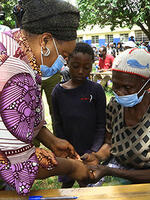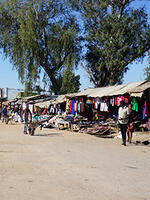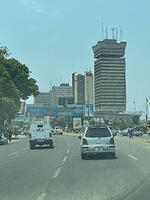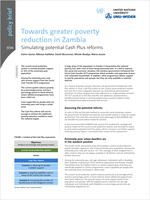Filter by...
Reset all
Publications (136)
Working Paper
pdf
This study explores the social protection and humanitarian emergency nexus in Zambia. Drawing on 25 stakeholder interviews and relevant literature sources, it seeks to (i) identify the social protection needs experienced in the country in the context of different shocks and crises; (ii) elucidate...
Working Paper
pdf
Raindrop in the drought? Vulnerability to climate shocks and the role of social protection in Zambia
Zambia’s reliance on rain-fed agriculture makes its economy and population highly vulnerable to frequent droughts and irregular rainfall. This paper assesses the role of social protection, specifically the Social Cash Transfer (SCT) program, in mitigating drought-induced poverty and consumption...
Working Paper
pdf
This paper exploits several waves of two major nationwide representative surveys to document the impacts of climate shocks on individuals and households in Zambia. We merge these datasets with historical precipitation and temperature data at the district level. First, we show the gendered effects of...
Working Paper
pdf
– Evidence from Zambia's formal sector
Low-income countries face the combined challenges of climate shocks and limited domestic revenue mobilization, yet these issues are rarely studied together. This paper provides new evidence on the impact of climate shocks on firm performance and tax revenue in a low-income country context, using...
Journal Article
– Insights from survey and tax administrative data in Zambia
This study examines how formal firms have been impacted by and recovered from the COVID-19 pandemic, by drawing on two distinct but complementary data sources. This is the first attempt to use both survey and tax administrative data to measure the impact of the pandemic in a developing country. The...
Journal Article
This peer-reviewed research is available free of charge. UNU-WIDER believes that research is a global public good and supports Open Access.
We investigate the behavioural responses of individual taxpayers to changes in marginal personal income tax rates applying empirical bunching methodology to tax administrative data from Zambia over the period from 2014 to 2021. We find evidence for excess bunching at the first kink in the tax...
Report
pdf
This report documents MicroZAMOD, the SOUTHMOD model developed for Zambia. This work was carried out by Zambia Institute for Policy Analysis & Research (ZIPAR) in collaboration with the project partners. The results presented in this report are derived using MicroZAMOD version 2.16, which is part of...
Working Paper
pdf
– Comparing the performance of universal basic income in Uganda and Zambia during COVID-19
The debate over universal basic income (UBI) has gained traction in the developing world in recent years. We analyse the effects of four UBI schemes on poverty and inequality measures during normal times and times of crisis in Uganda and Zambia. We use static microsimulation models and nationally...
Working Paper
pdf
This paper explores two policy interventions in Zambia, a minimum wage hike in 2018 and an upward revision in the first kink in the progressive income tax schedule in 2017, to examine and compare the impact of minimum wage and tax kink changes on wages and the earnings distribution in the formal and...

The Zambian government wants to reduce poverty by 20% by 2030. To make this happen, the government reformed their national cash transfer programmes. But what was the potential impact? In 2021, our MicroZAMOD team conducted an assessment—recommendations of which have been adopted at the highest level...
Working Paper
pdf
– Simulation results for Zambia
The COVID-19 pandemic increased public debt and changed the income distribution in many countries. We use a numerical simulation approach to derive optimal nonlinear marginal tax rates for the pre-crisis and crisis periods. We contribute to the literature by examining optimal tax rates numerically...
Working Paper
pdf
– Evidence from Zambian tax administrative data
We investigate the behavioural responses of individual taxpayers to changes in marginal personal income tax rates applying empirical bunching methodology to tax administrative data from Zambia over the period from 2014 to 2021. We find evidence for excess bunching at the first kink in the tax...
Working Paper
pdf
– A comparative perspective
We examine the distributional effects of the COVID-19 pandemic and associated tax-benefit measures in seven sub-Saharan African countries, focusing on the onset of the crisis.We evaluate impacts on disposable incomes, considering variations across income groups; assess the effectiveness of tax...

Across Kenya, Malawi, and Zambia, political candidates often attempt to buy the votes of the most socio-economically deprived communities. But new research from Prisca Jöst and Ellen Lust argues that social cohesion in these communities is instrumental in determining the levels of support for...
Report
pdf
This report documents MicroZAMOD, the SOUTHMOD model developed for Zambia. This work was carried out by Zambia Institute for Policy Analysis & Research (ZIPAR) in collaboration with the project partners. The results presented in this report are derived using MicroZAMOD version 2.15 running on...

Zambia is putting in place fiscal measures to improve the efficient collection of domestic revenue to finance social and public infrastructure. This analysis shows how much more revenue can be accumulated if tax evasion was at the bare minimum.Tax gap describes the share of the potential tax revenue...

Along with several other African countries, Zambia has introduced a withholding system for value-added tax (VAT) to improve revenue collection and compliance. Even though VAT withholding policies are applied in several countries in Africa and similar industry-specific policies in Europe, empirical...

– What Zambia is doing right
Over half of Zambia’s population lived below the national poverty line in 2015. In rural areas, where 89% of households are engaged in agriculture, the poverty rate was even higher, at 77% of the population. The government runs several programmes of financial support for farmers. Some provide...
Working Paper
pdf
– A bottom-up approach based on audit assessments
Assessing tax gaps—the difference between the potential and actual taxes raised—plays a vital role in achieving positive domestic revenue objectives through improved and reformed taxation. This is particularly pertinent for growth outcomes in developing countries. This study uses a bottom-up...
Working Paper
pdf
Improving tax collection is essential if developing economies are to avoid over-reliance on external donor funds and loans. Revenue authorities in the Global South have recently adopted new policy tools to improve domestic revenue mobilization through taxes.One such new policy is a withholding...
Working Paper
pdf
We study the effectiveness of social protection benefits in reducing income and consumption poverty in five sub-Saharan African countries—Ghana, Mozambique, Tanzania, Uganda, and Zambia—in normal times and times of widespread economic crisis. Using tax–benefit microsimulation models with...
Working Paper
pdf
– A microsimulation approach
This paper examines the distributional impacts of agricultural policies versus those of cash transfers using a tax–benefit microsimulation model for Zambia for the policy year 2020. The analysis also considers the behavioural impacts of input subsidies and social cash transfers. The results indicate...

– Evidence from tax administrative and survey data in Zambia
Like most other countries, the government of Zambia introduced restrictions to control COVID-19, which considerably curtailed normal economic activity. A new WIDER and World Bank working paper, a multi-institutional collaboration of UNU-WIDER, the World Bank, the Zambia Revenue Authority and the...
Working Paper
pdf
– Insights from survey and tax administrative data in Zambia
This paper examines how formal firms have been impacted by and recovered from the pandemic by drawing on two distinct but complementary data sources. This is the first attempt to use both survey and tax administrative data to measure the initial decline and subsequent recovery of firm sales and...

– Policy options for a sustainable fiscal regime
This brief provides concrete proposals on how Zambia's government could create a robust fiscal regime to achieve a steady flow of mineral revenue and encourage increased local participation in mining — while ensuring environmental sustainability.Zambia has had many mineral tax regimes and mining...
Report
pdf
View the latest MicroZAMOD country report here. This report documents MicroZAMOD, the SOUTHMOD model developed for Zambia. This work was carried out by Zambia Institute for Policy Analysis & Research (ZIPAR) in collaboration with the project partners. The results presented in this report are derived...
Technical Note
pdf
Agricultural subsidies may have significant productive and distributional consequences, and policy-makers need to be able to assess these impacts as a part of the overall tax and benefit policy. Microsimulation models offer a tool for such analysis also in developing countries, but their coverage...

Millions of Africans lost their jobs as a result of the coronavirus pandemic, but state social security systems were of little help to people who lost their income.This is the conclusion of a study conducted by the United Nations University World Institute for Development Economics Research, UNU...

– New perspectives on travelling for research
Working for an international organisation presents a host of challenges, given the vast nature of tasks that one must surmount in a fast paced and changing environment. It might be a roller coaster, but also satisfying by providing many worthwhile experiences. The latter was my sensation during my...
Working Paper
pdf
– Policy options for a sustainable fiscal regime
Zambia has changed its mineral tax regime repeatedly during the past decades in a bid to raise mineral revenue, but with only modest success. This paper looks at what the country needs to do to create a mining fiscal regime that could sustain operations, boost output, and raise revenues without...

– Simulating potential Cash Plus reforms
A large share of the population in Zambia is living below the national poverty line, with most of them being extremely poor. In a bid to improve the social and economic situation, the Zambian government introduced the Social Cash Transfer (SCT) programme which provides cash payments to poor and...
Working Paper
pdf
– Simulating potential Cash Plus reforms using MicroZAMOD
A large share of the population in Zambia is living below the national poverty line. To reduce poverty, in 2019, the government initiated the Cash Plus reform, which aims to build on the existing Social Cash Transfer as a floor benefit with additional benefits to take account of the...
Displaying 32 of 136 results
 Join the network
Join the network